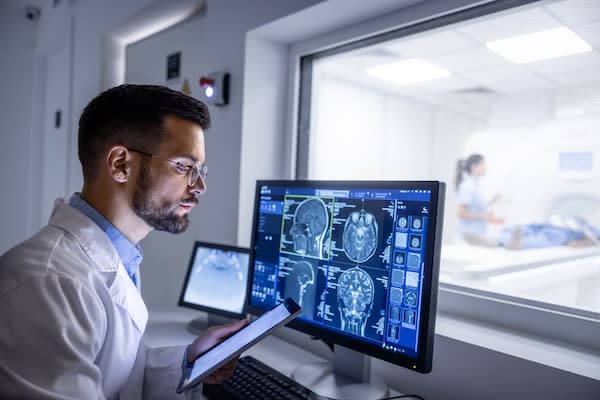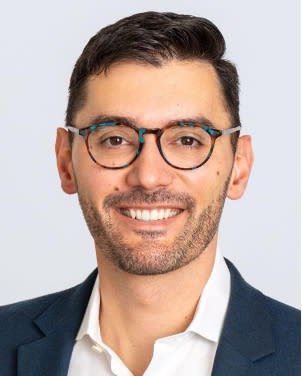
[5 MIN READ]
In this article:
- Learning that you or your loved one has brain cancer is scary. Yet Providence Swedish neuro-oncologist Alipi Bonm, M.D., Ph.D., wants you to know there are good options to treat the disease, and there’s always hope.
- Dr. Bonm offers six things to know about brain cancer that may not be universally understood, including some key ways brain cancer is different from other cancers.
- Not all brain tumors are the same. Patients can be traumatized by reading information online that may not pertain to their specific tumor, which is why Dr. Bonm suggests always speaking with a neuro-oncologist about your options first.
What a neuro-oncologist wants you to know about brain cancer
Perhaps more than any other cancer, brain cancer can have lasting and life-changing impacts. A tumor that develops in the brain can affect everything from your physical abilities to your cognitive and psychological health.
Alipi Bonm, M.D., Ph.D., a neuro-oncologist at the Ivy Center for Advanced Brain Tumor Treatment in Seattle, understands that brain cancer is scary. He recently joined the Providence podcast team for an episode of Cancer, Cures & Coffee to break down brain cancer and brain cancer treatment, and give people some insights into what they should know about the disease.
6 things to know about brain cancer
A brain cancer diagnosis is serious. But there are some important things to know about the disease that Dr. Bonm wants to highlight:
1. It’s generally referred to as a brain tumor, not brain cancer.
Cancer that affects the brain is different from other forms of cancer. That’s because the brain is a complex organ that controls every function in the body — from walking and talking to eating and breathing. Even if you develop a noncancerous, or benign, tumor in the brain, it can still cause side effects and be life-threatening because it can grow and press on sensitive areas, causing serious side effects.
For this reason, both benign and cancerous tumors in the brain may require treatment.
2. It’s relatively rare.
According to the American Cancer Society, the lifetime risk of developing a cancerous, or malignant, tumor on the brain or spinal cord is less than 1%. Most brain tumors don’t have an obvious cause, but there are a few factors that can increase your risk of developing a tumor in the brain, such as:
- A weakened immune system
- Certain genetic disorders
- Past radiation to the body, especially the brain
3. Brain tumors are graded.
Unlike other cancer types, brain cancer is graded, not staged. That’s because, unlike other cancers, brain tumors don’t tend to spread outside the brain. Other types of cancers, like lung and breast, can — and often do — spread to the brain, however. When cancer spreads from somewhere else in the body to the brain, it’s called a secondary cancer.
For primary brain cancers, doctors grade the tumor based on how its cells look under a microscope. The lower the grade, the less likely the tumor will grow quickly and invade nearby tissues. The higher the grade, the more aggressive the tumor is, and the more likely it is to grow quickly and into surrounding tissues.
4. Aside from headaches, pain isn’t a common symptom.
The most common symptom brain tumors cause is headaches, Dr. Bonm says, particularly headaches that develop at night while you’re lying down and go away in the morning.
Other symptoms include seizures and focal neurologic deficits, which are problems with the way the body works. For example, you may notice you’re starting to drop objects out of one of your hands or are unable to grasp things. Or, while walking, you keep falling to one side.
Still, what doctors most often hear from someone diagnosed with a brain tumor is, ‘I feel fine’ or ‘I feel normal,’” Dr. Bonm says. “It’s usually kind of a shock.”
5. Pay attention to onset and timing when distinguishing a brain tumor from a stroke.
Because a lot of stroke education centers around a loss of function, it’s important to remember that the main way to tell the difference between a stroke and a brain tumor is onset and timing, Dr. Bonm says.
A stroke happens suddenly, while symptoms from brain tumors typically develop more slowly — especially those accompanying lower-grade tumors. For instance, Dr. Bonm says, you may hear someone say they’ve been having increasing trouble using their right hand over the past few days or weeks and now can’t use it at all.
That said, he notes, it’s important to point out that aggressive types of brain tumors can cause sudden symptoms that prompt an immediate trip to the emergency room.
6. Promising new treatment options are emerging.
Brain tumors are sometimes challenging to treat because of their location. The type of tumor, its grade and other factors typically guide treatment for brain cancer. Still, the first step is usually to remove as much of the tumor as possible without affecting normal brain function.
“We know that if we can remove 80% of the tumor without causing a new neurologic deficit, there’s a survival benefit,” Dr. Bonm says. “If we can remove 85% of the tumor, it’s even better. So, for every additional 5% of the tumor that can be removed, there are additional survival benefits.”
Often, neurosurgery is combined with other forms of treatment, such as radiation therapy and chemotherapy. But doctors are also now looking to newer treatments like targeted therapy and immunotherapy to treat brain cancer. For example, if a brain tumor has a change, or mutation, in either the IDH1 or IDH2 gene, it may respond to a type of targeted therapy drug known as an IDH inhibitor.
Similarly, Dr. Bonm points to the promise of immunotherapy to treat brain cancer.
“I think most of us are very interested in learning more about how we can get the immune system to ignite a robust immune response against the tumor,” he says. “It’s been a very successful approach in other tumors, but less successful so far in our field.”
Dr. Bonm hopes further research and clinical trials will help scientists overcome the obstacle of the blood-brain barrier — the layer of cells that acts as a filter for the brain — and make immunotherapy drugs more effective at treating brain tumors.
Support for people with brain cancer and their caregivers
Dr. Bonm says the most important takeaway about brain cancer is this: “Brain tumors are scary, but there are good options. If you or somebody you know is facing a brain tumor diagnosis, it’s important to get lots of opinions, including second opinions if necessary, and be sure you’re comfortable with your treatment team and comfortable in the knowledge that you’re getting the best possible cancer care.”
He also notes several support options for people with brain cancer and their family members and loved ones, including monthly support groups for patients and caregivers run through the Ivy Center. Groups like these can help improve your overall quality of life.
You can also find support groups through national organizations like the National Brain Tumor Society and the Brain Tumor Network.
Contributing caregiver

Alipi Bonm, M.D., Ph.D., is a neuro-oncologist at the Ivy Center for Advanced Brain Tumor Treatment in Seattle.
Find a doctor
If you are looking for a cancer specialist, neurologist or neuro-oncologist, you can search for one who’s right for you in our provider directory. Our care teams provide advanced and coordinated treatment plans for brain and spine tumors that are patient-centered and compassion-based.
Download the Providence app
It’s all in the app: easily stay connected with Providence and your health. With the Providence app, you can schedule appointments, have virtual visits from the comfort of your own home, get health recommendations personalized for you, access your health records and so much more. Learn more and download the app.
Related resources
Personalized cancer peptide vaccine shows remarkable promise against glioblastoma
Leading-edge care for brain tumors
Providence Regional Cancer System patient navigator focuses on head and neck cancers
This information is not intended as a substitute for professional medical care. Always follow your health care professional’s instructions.
About the Author
More Content by Providence Cancer Team





















